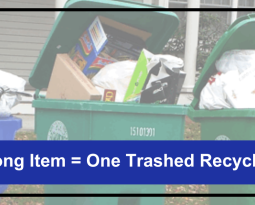Fix a Leak Week: March 14 – 20, 2022
 Fix a Leak Week is a time in March that is set aside to raise awareness about how you can find and fix leaks inside and outside your home so you save valuable resources: water and money.
Fix a Leak Week is a time in March that is set aside to raise awareness about how you can find and fix leaks inside and outside your home so you save valuable resources: water and money.
The average household’s leaks can account for nearly 10,000 gallons of water wasted every year and 10% of homes have leaks that waste 90 gallons of water or more per day. Common types of leaks found in the home are worn toilet flappers, dripping faucets, and other leaking valves. These types of leaks are often easy to fix, requiring only a few tools and hardware that can pay for themselves in water savings. The best part? Fixing easily corrected household water leaks can save homeowners about 10% on their water bills.
Here are some of the places leaks may be hiding around your home:
- Toilets: Listen for running water and conduct a food coloring test. Place a drop of food coloring in the toilet tank. If any color shows up in the bowl after 10 minutes, you have a leak. (Be sure to flush immediately after the experiment to avoid staining the tank.) And consider replacing your leaky toilet with a new, high-efficiency model that uses 1.1 gallons per flush or less. Apply for the Metro Atlanta toilet rebate program here.
- Showerheads: Some leaky showerheads can be fixed by making sure there is a tight connection between the showerhead and the pipe stem and by using pipe tape to secure it. Turn on and look for drips or stray sprays that can be stopped with tape.
- Faucets: Listen for drips and turn on the tap to check for water going the wrong direction. Leaky faucets can be fixed by checking faucet washers and gaskets for wear and replacing them if necessary.
- Water heater: Check beneath the tank for pooling water, rust, or other signs of leakage.
- Hoses: Check your garden hose for leaks at its connection to the spigot. If it leaks while you run your hose, replace the nylon or rubber hose washer and ensure a tight connection to the spigot using pipe tape and a wrench.
For more details on how and where to check for leaks, tutorial videos, and more, check out the EPA’s Fix a Leak Week website.








